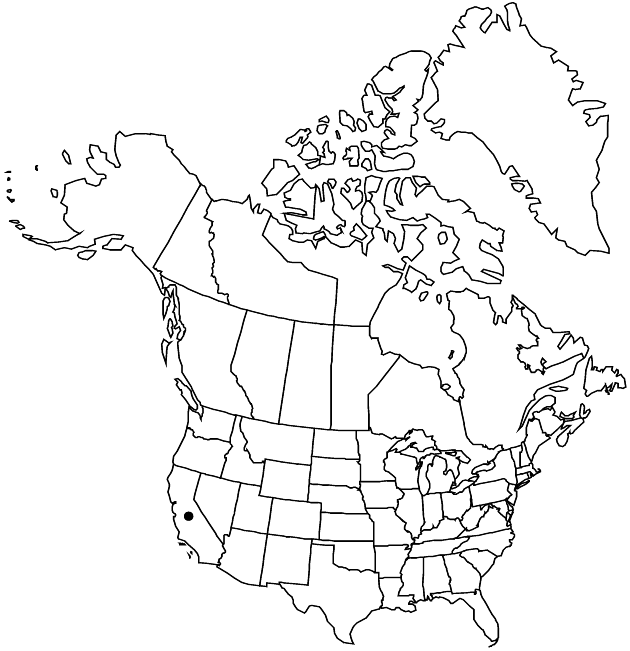Difference between revisions of "Chaenactis glabriuscula var. lanosa"
Univ. Calif. Publ. Bot. 3: 192. 1907.
FNA>Volume Importer |
imported>Volume Importer |
||
| (3 intermediate revisions by 2 users not shown) | |||
| Line 8: | Line 8: | ||
}} | }} | ||
|common_names=Sand buttons;South Coast Ranges pincushion | |common_names=Sand buttons;South Coast Ranges pincushion | ||
| + | |special_status={{Treatment/ID/Special_status | ||
| + | |code=E | ||
| + | |label=Endemic | ||
| + | }} | ||
|basionyms={{Treatment/ID/Basionym | |basionyms={{Treatment/ID/Basionym | ||
|name=Chaenactis lanosa | |name=Chaenactis lanosa | ||
|authority=de Candolle | |authority=de Candolle | ||
| + | |rank=species | ||
|publication_title=in A. P. de Candolle and A. L. P. P. de Candolle, Prodr. | |publication_title=in A. P. de Candolle and A. L. P. P. de Candolle, Prodr. | ||
|publication_place=5: 659. 1836 | |publication_place=5: 659. 1836 | ||
| Line 17: | Line 22: | ||
|name=Chaenactis glabriuscula var. denudata | |name=Chaenactis glabriuscula var. denudata | ||
|authority=(Nuttall) Munz | |authority=(Nuttall) Munz | ||
| + | |rank=variety | ||
}} | }} | ||
|hierarchy=Asteraceae;Asteraceae tribe Heliantheae;Asteraceae (tribe Heliantheae) subtribe Chaenactidinae;Chaenactis;Chaenactis sect. Chaenactis;Chaenactis glabriuscula;Chaenactis glabriuscula var. lanosa | |hierarchy=Asteraceae;Asteraceae tribe Heliantheae;Asteraceae (tribe Heliantheae) subtribe Chaenactidinae;Chaenactis;Chaenactis sect. Chaenactis;Chaenactis glabriuscula;Chaenactis glabriuscula var. lanosa | ||
| Line 32: | Line 38: | ||
|elevation=10–700(–1400) m | |elevation=10–700(–1400) m | ||
|distribution=Calif. | |distribution=Calif. | ||
| − | |discussion=<p>Variety lanosa is known mainly from the Coast Ranges of central California. Most (but not all) specimens from farther south (Pacific coast and Santa <i>Rosa</i> Island) and southeast (Transverse Ranges to Sonoran Desert edges) are intermediate with vars. megacephala or glabriuscula; these are sometimes recognized as < | + | |discussion=<p>Variety lanosa is known mainly from the Coast Ranges of central California. Most (but not all) specimens from farther south (Pacific coast and Santa <i>Rosa</i> Island) and southeast (Transverse Ranges to Sonoran Desert edges) are intermediate with vars. megacephala or glabriuscula; these are sometimes recognized as <i></i>var.<i> denudata</i>. Northward, intermediates with <i></i>var.<i> heterocarpha</i> are known.</p> |
|tables= | |tables= | ||
|references= | |references= | ||
| Line 41: | Line 47: | ||
-->{{#Taxon: | -->{{#Taxon: | ||
name=Chaenactis glabriuscula var. lanosa | name=Chaenactis glabriuscula var. lanosa | ||
| − | |||
|authority=(de Candolle) H. M. Hall | |authority=(de Candolle) H. M. Hall | ||
|rank=variety | |rank=variety | ||
| Line 55: | Line 60: | ||
|publication title=Univ. Calif. Publ. Bot. | |publication title=Univ. Calif. Publ. Bot. | ||
|publication year=1907 | |publication year=1907 | ||
| − | |special status= | + | |special status=Endemic |
| − | |source xml=https:// | + | |source xml=https://bitbucket.org/aafc-mbb/fna-data-curation/src/2e0870ddd59836b60bcf96646a41e87ea5a5943a/coarse_grained_fna_xml/V19-20-21/V21_1034.xml |
|tribe=Asteraceae tribe Heliantheae | |tribe=Asteraceae tribe Heliantheae | ||
|subtribe=Asteraceae (tribe Heliantheae) subtribe Chaenactidinae | |subtribe=Asteraceae (tribe Heliantheae) subtribe Chaenactidinae | ||
Latest revision as of 20:07, 5 November 2020
Plants 8–15(–35) cm; proximal indument whitish, ± densely lanuginose. Stems mostly 1–12, decumbent to erect; branches none or strictly proximal. Leaves ± basal (persistent), 2–10 cm; largest blades ± plane or terete, scarcely succulent, 0–1-pinnately lobed; lobes 1–2(–5) pairs, remote, ± plane to terete. Heads 1(–3) per stem. Peduncles 8–20(–30) cm. Involucres ± hemispheric to obconic. Phyllaries: longest 6–8 × 1–2 mm; outer ± densely lanuginose in fruit. Florets: inner corollas 5–6.5 mm. Cypselae 4–6 mm; pappi of 4 scales in 1 series, longest scales mostly 4–6 mm, lengths 0.8–0.9(–1) times corollas. 2n = 12.
Phenology: Flowering Mar–June.
Habitat: Deep loose sand (typical forms, intermediate forms also in habitats of other vars.), openings in chaparral
Elevation: 10–700(–1400) m
Discussion
Variety lanosa is known mainly from the Coast Ranges of central California. Most (but not all) specimens from farther south (Pacific coast and Santa Rosa Island) and southeast (Transverse Ranges to Sonoran Desert edges) are intermediate with vars. megacephala or glabriuscula; these are sometimes recognized as var. denudata. Northward, intermediates with var. heterocarpha are known.
Selected References
None.
